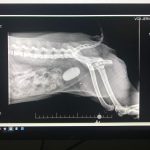Good morning-
Im sure you are getting her into see your vet right away. I would have a very in depth conversation regarding your budget and what you expect as well as your concerns and Mila’s overall comfort level. Years ago one of our cat’s had a urinary blockage and I do remember him being kept for a few nights, catheterized, and surgery to remove the blockage and Rx cat food for the remainder of his years. And it was expensive, and it was a long recovery, but he did well. I hope Mila does too.
I just learned from Dr Magnifico that little white dogs love their bladder stones.
I have a little white dog. She does not have bladder stones as far as I can tell and I’d like to keep it that way. She’s a maltese, about five or six years old, a puppy mill rescue I adopted about seven months ago. I also have a 13-year-old dorkie and a vet I’ve been seeing for almost 25 years.
I’m lazy and don’t count on myself to brush my dogs’ teeth so I’ve always fed my dogs Hills Science Diet t/d (large size kibble). They also get rawhide chews sold by my vet. The maltese’s stool is very dry compared to the dorkie’s.
Is there anything I should be doing to reduce the risk of bladder stones? Half wet food half kibble, maybe? Flavour their water?
Thank you!
Alison
Comments
We brought Mila, my 7 year old mixed domestic savannah chausie female spayed kitty, early this morning for emergency attention because she was moaning and groaning in pain last night and could hardly move. Prior to this morning she had been seen two weeks ago at the same emergency clinic and her primary vet. Both determined she had crystals and a UTI and prescribed medication which we’ve been giving as instructed along with keeping her on the strict urinary care diet from hills c/d.
She tried yesterday and this morning to use the litter box but was unsuccessful in relieving herself so we had to treat it as if she was experiencing a blockage which you know is very dangerous.
The Dr. was able to express Mila’s full bladder and found no blockage there, but said Mila was in a lot of pain while undergoing the procedure. She did not feel any stool so Mila is not considered to be constipated, but a good sized stone or crystal was visible during the ultrasound.
The Dr. strongly believes Mila still has a UTI and wants to get that under control first, so we were given the following medications:
Pradofloxacin (antibiotic)
Prazosin (for urethral spasms)
We were also instructed to increase the dosage of the Gabapentin from 0.3ml every 12 hours to 0.5ml every 8 hours since it didn’t seem to be doing enough in terms of managing Mila’s pain. She was previously on buprenorphine for pain but we were concerned that it was constipating her.
We need to bring Mila in as soon as possible to perform another urinalysis and culture as was recommended by the Emergency clinic. This was recommended to determine whether or not the bacteria from the UTI has spread to Mila’s kidneys.
We chose to decline those diagnostics at the emergency Clinic today as they were going to charge an additional $800 for an already expensive treatment and we felt more comfortable going through our primary vet for Mila (the diagnostics will cost a fraction of what emergency quoted.)
I want to do everything I can for Mila but we are now in the hole nearly $2k at the point between the two emergency visits and the primary vet visit, so wanting to know what is necessary now Vs. what can be phased in.
I hate seeing her in pain and I’m just worried that she isn’t improving.
Comments
Do FEMALE cats need bladder flush? FEMALE cat only pees a tiny bit. Keeps running to litter box. Trying to use it elsewhere. Doesn’t want to drink anymore. Antibiotics don’t help
Comments
So we stumbled upon a 2 yr old puggle who was going to be surrender to the Humane Society. We were told that she is being treated for a UTI but was very healthy. The owners were keeping her in a cage for 12-15 hrs which would definitely cause the UTI. So we asked around and found a family member in NY that was willing to take her. Long story short, we took her to NY and got her a check up. She doesn’t only have a UTI but also a huge stone in her bladder which needs to be removed surgically. My mother in law cannot afford this surgery being on a fixed income. Being the owner of 5 of my own pets, I cannot afford it either. But we don’t want this sweet dog going back to the owner or shelter. Can you recommend somewhere that would consider doing pro-bono or discounted work for rescue pets? We plan on bringing her back to Maryland tonight.
Comments
I’m 27 and have had my dog since college. He’s a 6-year-old male Cockapoo who I adore, and who is normally in great health (besides the occasional ear infection). I take him on an hour and half walk daily, feed him a potato and duck based diet, and make every attempt to give him the best care possible (regular vet check-up, shots, etc).
A couple months ago I realized he was frequently squatting to pee, but nothing comes out. He urinates normally when first let out, but then makes a ton of other squats, prolonged squats, where nothing or just a few drops comes out. At times, its almost impossible to walk at all as he will continue to squats over and over again for 30 minutes. He hasn’t had any incontinence or more than normal desire to go outside (except for every now and then, when he’ll go out, pee once, then keep squatting over and over again and want to go out soon after- but that’s not daily). However, I woke up this morning to a couple drops of blood on the carpet, which I can only assume were from his many attempts. Previously, there has been no presence of blood in his urine.
I’ve been to the vet SEVERAL times, and spent the majority of my savings and money trying to figure out what’s wrong (even with vet insurance, I’ve spent almost all I have). He has had a cystoscopy (camera inserted) to check for urethral cancer (none), full abdominal ultrasound, plenty of x-rays and blood tests done. They have ruled out bladder cancer, his blood work is normal, and the x-rays show nothing except a slightly enlarged liver (though since blood work is normal so they think the was born with it). They have ruled out a UTI, bladder stones, and just about everything else you can think of that would seem obvious. The only abnormalities are really the dysuria, mildly protruding abdomen, the appearance of a layer of fluid on the outside of his bladder, and some abnormal bacteria.
Please help. I can’t afford much more and I really love my dog.
General information about Jackson included in the attached images.
My Greater Swiss Mountain Dog (giant breed) has been having recurrent UTIs. She went to a new vet today for an ultrasound of her bladder to check for stones. She was supposed to be at the vet’s all morning, but due to unexpected developments, they were able to get her in right away. The vet called me and mentioned that they’d found nothing on the ultrasound, but she wanted to do a digital vaginal exam to check for abnormalities in the vagina. I said “yes” but had second thoughts right after hanging up – the vet was a new person to my dog, after all, which might make a necessary but invasive procedure scarier. I called back to ask them to wait so I could at least be there for reassurance, but the line was busy, and by the time I got through, the exam had been done.
My dog seemed just fine when I picked her up, and we all know that dogs are not the most particular about their hindquarters, as sniffing attests, but this was a bit more invasive than sniffing, so I have to ask: how much discomfort (in all senses) do dogs feel during a vaginal exam? I know it’s difficult to ascertain, but – well, I gotta ask.











Hello!
The best ways that I know to avoid bladder stones is a good diet. Leaving fresh clean water available at all times and checking a urine every 6-12 months. Also on some little dogs I can palpitate rhe bladder for clues about its contents. If you want to be super pro active an X-ray or ultrasound is the best diagnostic tool for looking inside the bladder.
Good luck! Thanks for the question
Thank you! I will follow up with regular palpation and urine testing.
Could my dogs’ diet be better in the context of bladder stones?